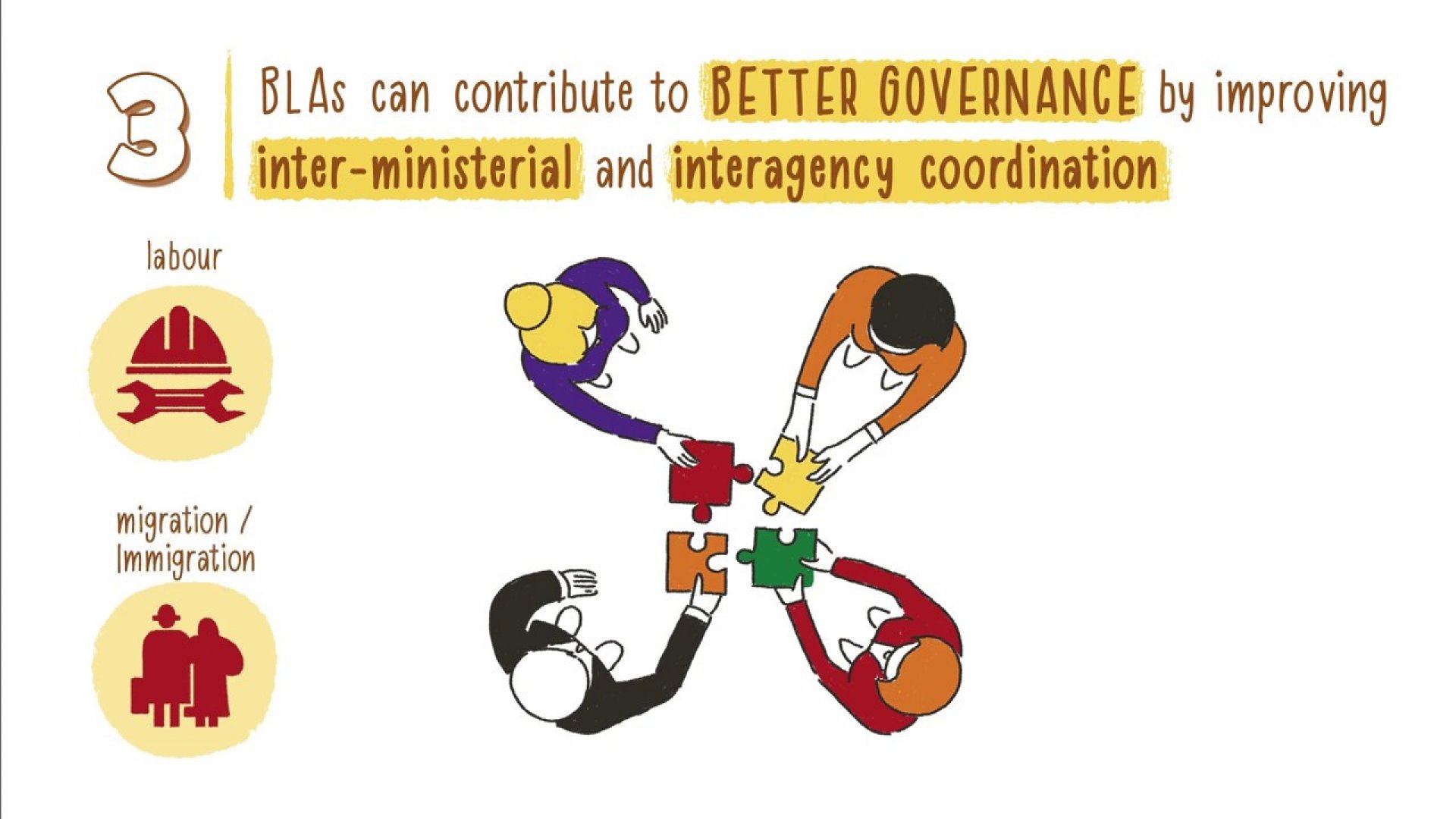Developing, Negotiating and Implementing Bilateral Labour Migration Agreements

Image © ILO/Samuele Omati
Developing, Negotiating and Implementing Bilateral Labour Migration Agreements
13 April–15 May 2026
The course is available in English
Key features
ORGANIZED APPROACH
The course is organized into two main technical blocks:
- Block I: Technical content on BLAs and MoUs
- Block II: Technical content on Negotiation Skills
GLOBAL PERSPECTIVE
An action-oriented, highly participative approach will be used, with particular attention devoted to sharing international experiences with a view to their adaptation and practical application.
INTEGRATED LEARNING
An innovative blended learning experience combining self-paced modules, lectures and discussions, case studies, forum debates, role-play exercises and group work using up-to-date learning methods. The course concludes with an individual final assignment.
BLAs SIMULATION EXERCISE
Participants will participate in a role-playing exercise on the negotiation of a BLMAs/MoUs
Introduction to the course
Recently bilateral labour agreements, such as bilateral agreements and memorandums of understanding on labour migration, have gained prominence as tools to facilitate the cross-border movement of workers. While bilateral agreements can play an important role in ensuring that labour rights of migrant workers are protected; in practice, they exhibit a number of shortcomings regarding their design, content, monitoring, implementation and impact. In response to these challenges and opportunities, the ITCILO designed this upcoming course on Negotiating Bilateral Labour Agreements, with a view to increasing the potential of BLAs in improving the governance of labour migration, promoting and protecting the rights of migrant workers, and enhancing migration and development linkages. This course aims to reinforce the negotiation skills and techniques of officials involved in the adoption and follow-up of bilateral and/or multilateral agreements.
Who attends this course?
The course is designed for: - stakeholders involved in the negotiation of bilateral and regional agreements/MoUs and migration issues, in particular officials dealing with migration policy and/or international relations; - policy-planners involved in the conclusion of bilateral labour agreements; - practitioners from public institutions and ministries dealing with migration policies and/or international relations; - representatives of workers' and employers' organizations.
What topics does this course cover?
Technical content on BLMAs and MoU
- Historical overview and current developments of bilateral labour migration agreements (BLMAs) and memorandum of understanding (MoU)
- Types and general features of BLMAs and MoU on labour migration
- Recent global and regional trends of BLMAs and MoU
- Normative foundations of bilateral labour agreements including Global Guidance on Bilateral Labour Migration Agreements
- Agreement Structure, Assessment and Good Practices
- Minimum standards/provisions for a bilateral agreement/MOU
- Skills Dimension in the BLMAs and MoU
- Social Protection provision in the BLMAs and MoU
- Adopting a gender-sensitive approach to the development and implementation of BLMAs and MoU
- How to make agreements work?
- Monitoring and evaluation
- Joint committees: role, TORs and agenda
- Good practice review: Bilateral Agreements/MOUs on Labour Migration
Technical content on Negotiation skills
- Process and stages of negotiating bilateral labour agreements;
- Characteristics of position-based and needs-based negotiation;
- Behaviours of effective negotiators
What will I be required to do during the course?
Course learning materials and tuition will be offered in English. The following requirements are therefore essential to participate in this course:
- the ability to use and access a computer with internet
- working knowledge of written English
- the availability to dedicate per week between 5-10 hours to the course and one full week to the residential phase which will take place in Turin.
Watch the video
What will I be able to do?
By the end of this course, participants will be able to:
- Discuss potential challenges for effective implementation of BLAs/MoUs and the way forward;
- Appreciate the role, objectives, challenges and opportunities associated with negotiating bilateral labour agreements (BLAs);
- Become familiar with key policy priorities that justify the need to adopt bilateral labour agreements;
- Identify good practices in bilateral labour agreements based on specific criteria drawn from international norms, and highlight agreements which could lead to better outcomes in terms of migration governance and protection of migrant workers;
- Improve capacity for critical review of existing BLAs and MOUs and negotiate for their revisions;
- Understand the negotiation process and techniques of effective negotiation, including through the simulation of a negotiation agreement.
Why should I join?
The Turin Centre is known for its innovative learning tools and methodologies.
- Course facilitators are subject matter experts and specialists.
- Training delivery includes online and tutor based learning opportunities.
- Participants exchange knowledge and ideas on existing good practices.
- This course qualifies for the ITCILO Diploma for Labour Migration Experts and Practitioners. Take the Academy on Labour Migration, three courses out of all eligible courses within a five year period, and complete a capstone project to become part of a global cadre of practitioners and experts with a recognised set of skills in labour migration policy.
How?
The course is composed of an online phase and a residential phase. The online phase consists of modules offered through the eCampus online platform to be completed over a period of 3 weeks. This will build the foundation for the residential component and will accompany formal training with activities fostering knowledge exchange and cross-fertilization of ideas. This will be followed by an online wrap-up phase. The course is broken down into three phases, for an estimated total of 60 learning hours:
- Pre-course learning: Flexible self-guided and tutor-led online learning on eCampus and an end of phase assessment.
- Residential learning: Face-to-face sessions and engaging presentations by highly experienced trainers, blended with individual and collaborative group exercises, peer-to-peer assessment and an end-of-phase assessment.
- End of course assignment: Individual assignment applying the key learnings to a concrete context.
Participants who successfully complete all assessments and the final assignment will receive a Certificate of Achievement.
How to apply?
Interested candidates should register on-line clicking on the “APPLY NOW” button at the top-right of the page.
Selection will be based on the following criteria:
- Proven work experience in relevant field;
- Submission of a letter of sponsorship to cover the total course fees.
Payment
The cost of participation is payable in advance by the participant or his or her sponsoring organization.



